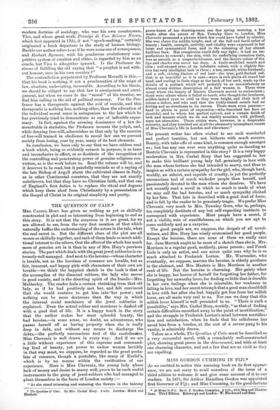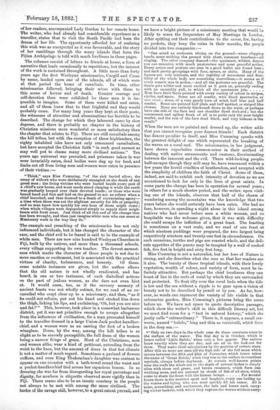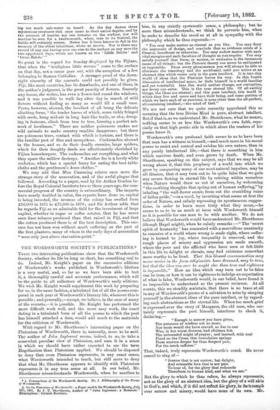MISS GORDON CUMMING IN FIJI.* As we omitted to notice
this amusing book on its first appear- ance, we are not sorry to avail ourselves of the issue of a third edition to welcome it and give some account of it to our readers. In 1875, Sir Arthur Hamilton Gordon was appointed first Governor of Fiji ; and Miss Cumming, to the good-fortune
• At Home in 1P•ji. By C. P. Gordon Cumming. 2 vols., with Map and Illustra- tions. Third Edition. Edinburgh and London: W. Blackwood and Bons.
of her readers, accompanied Lady Gordon to her remote home.
The writer, who had already had considerable experience as a traveller, states that to visit the South Pacific had been the
dream of her life. The opportunity afforded her of realising
this wish was as unexpected as it was favourable, and the story of her ramblings through the many islands that form the Fijian Archipelago is told with much liveliness in these pages.
The volumes consist of letters to friends at home, a form of narrative that leads occasionally to repetitions, but the interest of the work is sustained throughout. A little more than forty years ago the first Wesleyan missionaries, Cargill and Cross by name, landed upon one of the islands, all of which were at that period the home of cannibals. In time, other missionaries followed, bringing their wives with them to this scene of horror and of death. Greater courage and self-devotion than were exhibited by these men it is im- possible to imagine. Some of them were killed and eaten, and all of them knew that to that frightful end they would probably come. For many long years they kept at their posts, the witnesses of atrocities and abominations too horrible to be described. The change for which they laboured came by slow degrees, and there is probably no chapter in the history of Christian missions more wonderful or more satisfactory than the chapter that relates, to Fiji. There are still cannibals among the hill tribes, but with the exception of these highlanders, the eighty inhabited isles have not only renounced cannibalism, but have accepted the Christian faith "in such good earnest as may well put to shame many more civilised nations." Ten years ago universal war prevailed, and prisoners taken in war were invariably eaten, dead bodies were dug up for food, and limbs cut off from living men and women were eaten in presence of their victims :—
"Think," says Miss Cumming, "of the sick buried alive; the array of widows who were deliberately strangled on the death of any great man ; the living victims who were buried beside every post of a chief's new house, and must needs stand clasping it while the earth was gradually heaped over their devoted heads ; or those who were bound band and foot and laid on the gronnd to act as rollers when a chief launched, and thus doomed to a death of excruciating agony— a time when there was not the slightest security for life or property, .and no man knew how quickly his own hour of doom might come ; when whole villages were depopulated simply to supply their neigh- bours with fresh meat. Just think of all this and of the change that .has been wrought, and then just imagine white men who can sneer at Missionary work in the way they do."
The example and preaching of the missionaries has not only influenced individuals, but it has changed the character of the race, and the chief evil to be feared is said to be the example of white men. There are now nine hundred Wesleyan Churches in Fiji, built by the natives, and more than a thousand schools, every village supporting its own teacher. The devout earnest- ness which marks the character of these people is not due to mere emotion or excitement, but is associated with the practical -virtues of charity, forbearance, and honesty. Of these, some notable instances are given, but the author allows that the old nature is not wholly eradicated, and has heard, in one or two instances, of such diabolical actions on the part of jealous women, as she dare not even hint at. It would seem, too, as if the savoury memory of ancient feasts was not wholly extinct, for we read of an ex- -cannibal who crept close up to a missionary, and then, "as if Ile could not refrain, put out his hand and stroked him down the thigh, licking his lips, and exclaiming,' Oh, but you are nice and fat!" This, however, took place in a somewhat barbarous district, yet it was not primitive enough to escape altogether from the influences of civilisation, for a man presented himself to the traveller dressed in a large Union-Jack pocket-handker- ehief, and a woman wore as an earring the foot of a broken wineglass. Dress, by the way, among the hill tribes is so slight as to be scarcely perceptible, the full dress of the women being a narrow fringe of grass. Most of the Christians, men and women alike, wear a kind of petticoat, extending from the waist to the knee, but the amount of dress in that hot climate is not a matter of much regard. Sometimes a garland of flowers suffices, and even King Thakomban's daughter was content to appear on one occasion with a bath-towel round the waist and a pocket-handkerchief tied across her capacious bosom. In so
dressing she was far from disregarding her royal parentage and -dignity, for nowhere is etiquette observed more rigidly than in Fiji. There seems also to be an innate courtesy in the people not always to be met with among the more civilised. The tastes of the savage still, however, to a great extent prevail, and
we have a bright picture of a missionary meeting that would be likely to scare the frequenters of May Meetings in London. After spitting out their contributions to the cause, for, having no pockets, they keep the coins in their mouths, the people divided into two companies :—
" One acted as orchestra sitting on the ground—some clapping bands, some striking the ground with short, resonant bamboos—all singing. The other company danced—the quaintest, wildest dances you can conceive, with much pantomime and most graceful action. Every action and posture one sees in a good ballet are found here ; and such pretty groupings with fans, spears, or clubs. Many of the figures are very intricate, and the rapidity of movement and flexi- bility of the whole body are something marvellous,—it seems as if every muscle was in action,—and all the postures are graceful. The dance gets wilder and more excited as it goes on, generally ending with an unearthly yell, in which all the spectators join Most have their faces painted with every variety of colour in stripes, circles, and spots. Some are all scarlet, with black spectacles, or vice versa; some, of a very gaudy turn of mind, half blue and half scarlet. Some are painted half plain and half spotted, or striped like clowns. Many are entirely blackened down to the waist, or perhaps have one side of the face and one shoulder dyed dark-red ; but the commonest and ugliest freak of all is to paint only the nose bright scarlet, and the rest of the face dead black, and very hideous is the result."
When the men are so painted and dressed up, the writer adds that you cannot recognise your dearest friends ! Each district has dances peculiar to itself, and Miss Cumming speaks with the greatest delight of one which represented the breaking of the waves on a coral reef. The missionaries, in her judgment, have shown superlative common-sense in their method of dealing with native amusements and customs, discriminating between the innocent and the evil. These wild-looking people, half-savages though they still may be, have renounced within a few years the horrid cruelties of heathendom, and accepted with the simplicity of children the faith of Christ. Some of them, indeed, are said to exhibit such intensity of devotion as we are accustomed to look for only in the lives of great saints. In some parts the change has been in operation for several years ; in others for a much shorter period, and the writer, upon visit- ing one of the islands, observes that half of the charm of wandering among the mountains was the knowledge that two years before she would certainly have been eaten. She had no fear, however, in spending a night alone in this island among natives who had never before seen a white woman, and so hospitable was the welcome given, that it was with difficulty she could escape the infliction of a great feast. The feasting is sometimes on a vast scale, and we read of one feast at which nineteen puddings were prepared, the two largest being respectively nineteen and twenty-one feet in circumference. On such occasions, turtles and pigs are roasted whole, and the deli- cate appetites of the guests may be tempted by a wall of cooked fish, five feet in height and sixty feet long.
Miss Cumming is not a naturalist, but her love of Nature is strong, and she describes what she sees so that her readers see it also. The beauty of those tropical islands, with their lovely vegetation, wealth of colour, and variety of form, must be in- finitely attractive. But perhaps the chief loveliness they can boast of lies in the reefs of coral by which they are surrounded and protected. To float idly over the coral beds when the tide is low and the sea without a ripple is to gaze upon a vision of beauty not to be described by pencil or by pen. As far, how- ever, as words can represent the variety of life visible in that submarine garden, Miss Cumming's pictures bring the scene before us. We have not space to quote descriptive passages, which show the writer's skill in this difficult literary art, but we must find room for a "fact in natural history," which she justly calls "extraordinary." There is, it appears, a small sea- worm, named " balolo," long and thin as vermicelli, which lives in the deep sea :—
a" Only on two days in the whole year do these creatures come to the surface of the water. The first day is in October, which is hence called Little Balolo,' when only a few sppear. The natives know exactly when they are due, and are all on the look-out for them. They make their calculations by the position of certain stars. After this no more are seen till the high tide of the full moon which occurs between the 20th and 25th of November, which hence takes the name of 'Great Balolo,' when they rise to the surface in countless myriads, always before daybreak. At certain well-known points near the reefs the whole sea to the depth of several inches is simply alive with these red, green, and brown creatures, which. form one writhing mass, and are pursued by shoals of fish of all sizes, which come to share the feast with the human beings For several hours there is the merriest sport and laughter, every one bailing up the worms and trying who can most quickly fill his canoe. All is noise, scrambling, and excitement, the lads and lasses each carry- ing wicker baskets, with which they capture the worms without carry. ing too much salt-water on board. As the day dawns these mysterious creatures sink Once more to their native depths, and by the moment of sunrise not one remains on the surface, nor will another be seen for a twelvemonth, when, true to its festival, the balolo will certainly return. Never has it been known to fail in the memory of the oldest inhabitant, white or brown. Nor is there any record of any one having seen one rise to the surface on any save the two appointed days, which are known as the Little Balolo ' and 'Great Balolo.' " So great is the regard for Sunday displayed by the Fijians, that when the "irreligious little worms" come to the surface on that day, not a canoe goes out, with the exception of a few belonging to Roman Catholics. A stronger proof of the down-
right sincerity of the converts could not possibly be given. Fiji, like most countries, has its drawbacks, and one of these, in the author's judgment, is the great paucity of flowers. Scarcely any house, she writes, has even a flower-bed round the windows, and it was possible to walk day after day in search of wild Bowers without finding as many as would fill a small vase. Ferns, however, abound, the loveliest of all being the delicate climbing ferns, "the tender leaves of which, some richly fringed with seeds, hang mid-air in long hair-like trails, or else, droop- ing in festoons, climb from tree to tree, forming a perfect net- work of loveliness." There are neither poisonous snakes nor wild animals to make country rambles dangerous ; but there are poisonous trees, contact with which is torture, and there is the familiar pest of flies and mosquitoes. Cockroaches abound in the houses, and so do their deadly enemies, large spiders,
which for their doughty deeds are affectionately cherished by Fijian housekeepers. The cockroaches eat everything, and what they spare the mildew destroys. "Another foe is a lovely white
cockatoo, which has a special fancy for eating the best table- cloths and the gentlemen's dress clothes."
We may add that Miss Cumming relates once more the strange story of the annexation, and of the awful plague that followed According to a paper, read by Sir Arthur Gordon be- fore the Royal Colonial Institute two or three years ago, the com-
mercial progress of the country,is extraordinary. The imports have nearly doubled in value, the exports have done so, capital
is being invested, the revenue of the colony has swelled from £16,000 in 1875 to £75,000 in 1879; and Sir Arthur adds that he regards Fiji as an admirable field for the investment of large capital, whether in sugar or coffee estates, that he has never seen finer tobacco produced than that raised in Fiji, and that the cotton produced there is of the best description. This suc- cess has not been won without much suffering on the part of the first planters, many of whom in the early days of annexation "were only just above starvation-point."




































 Previous page
Previous page